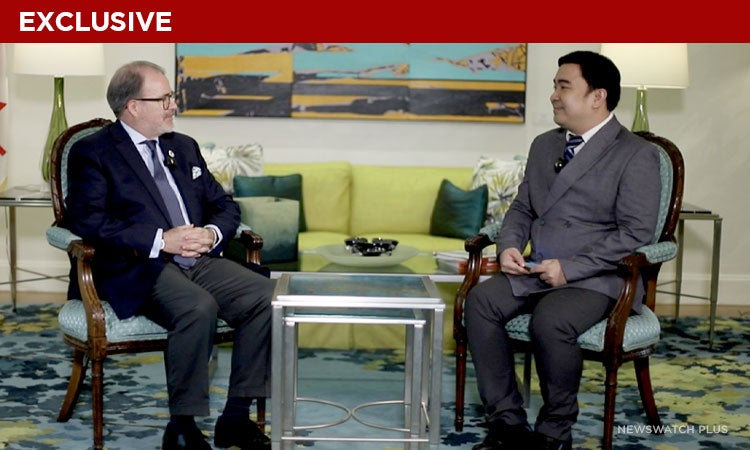To sum up:
+ Smooth progress in negotiations: Canadian Ambassador David Hartman reports that SOFVA negotiations with the Philippines are advancing quickly, following a defense cooperation MOU signed earlier this year.
+ No major roadblocks expected: Strong political will from both Canada and the Philippines is expected to expedite the traditionally lengthy process of finalizing the SOFVA.
+ Enhanced military cooperation: The SOFVA will enable more joint military exercises and emergency deployments, bolstering the Philippines' defense capabilities and sovereignty.
Metro Manila, Philippines — The Philippines is close to concluding negotiations for a military agreement with another ally.
In an exclusive interview with NewsWatch Plus, Canadian Ambassador to the Philippines David Hartman said negotiations are progressing smoothly for a Status of Visiting Forces Agreement (SOVFA) following the signing of a Memorandum of Understanding (MOU) on defense cooperation earlier this year.
“So we are exchanging draft text now with the Department of National Defense here between our Department of National Defense back in Canada. So I'm very proud to highlight that the negotiations are moving along very quickly,” said Hartman.
Hartman said he is optimistic that Ottawa and Manila can follow a course similar to the Philippine-Japan Reciprocal Access Agreement (RAA), which was signed on July 8.
“We’re optimistic that we can also advance the timelines of what traditionally would have been a much lengthier process. But I think because of circumstances, and I think because of real, tangible commitment on both sides, Canada and the Philippines, we're very hopeful that we can conclude this sooner rather than later,” Hartman added.
The Canadian ambassador did not provide a timeline for signing the agreement, but talks will wrap up this year or next.
“Certainly within the next year, I mean, ideally, frankly, before the end of the calendar year, I think that would certainly be our level of ambition, again, to conclude this so quickly,” Hartman added.
Canada sees no roadblocks to the security deal.
“At this stage, frankly, where there's the political will, which I can certainly confirm exists on the Canadian side. If we do see that fully reciprocated on the Philippine side, then candidly speaking, there should be no challenges to us concluding, you know, expeditiously,” said Hartman.
The Canadian envoy stated that the SOFVA with the Philippines will be similar to other security deals so as not to reinvent the wheel. Canada added that a SOFVA will also mean more exercises on both sides.
“It's very similar. So basically, it allows, you know, for the joint exercises, much more overt active joint exercising for, you know, Canadian forces to participate on Philippine soil in an emergency for the ability to deploy here to help defend all of these types of things,” said Hartman.
So, you know, overall, these types of agreements are generally quite the same. And so the model that we're looking to adopt would be one that's very similar to what the Philippines has already achieved with other like-minded partners,” he added.
Will another VFA lead to militarization of the South China Sea?
Hartman said the rising number of security deals with the Philippines indicates that Manila is not alone in upholding the rule of law.
“I think from our vantage, it's trying to send a strong signal to the people of the Philippines that you are not alone in defending your own interests, whether it's your territorial integrity, your territorial sovereignty, all of these types of issues,” he said
“I mean, Canada, as many will acknowledge, is not a terribly militaristic country. We do have a very proud tradition of defending our friends and allies in their time of need,” he said.
“And so I think people that would have a pessimistic view of that, I think it's a bit overblown. If I may be so bold, I don't share that view at all,” the ambassador added.
The Philippines has a VFA with the United States and Australia.
France is also crafting the first draft of its VFA with the Philippines.

